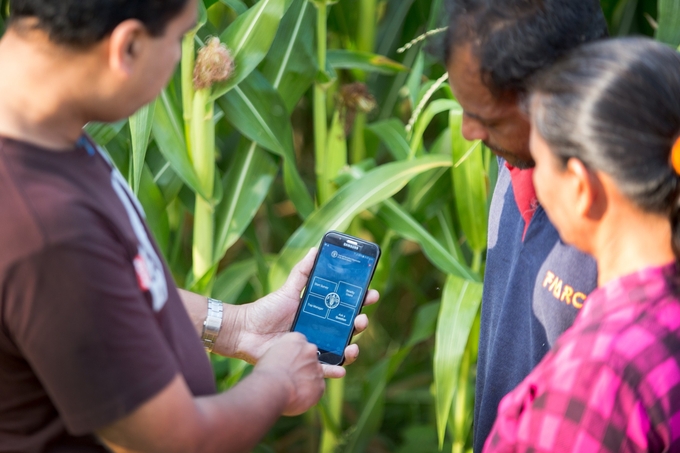November 24, 2025 | 17:22 GMT +7
November 24, 2025 | 17:22 GMT +7
Hotline: 0913.378.918
November 24, 2025 | 17:22 GMT +7
Hotline: 0913.378.918

FAO's work involves scientific approaches, innovation, and the latest technologies.
The Food and Agriculture Organization of the United Nations (FAO) is marking this year’s International Day of Plant Health by shining a light on the importance of leveraging innovation to protect plants, which are indispensable for sustaining life on earth.
This year’s observance on May 12 focuses on the many innovations that cut across areas where plant health is crucial – such as plant pest monitoring to protect agricultural production – and digital systems to ensure the safe international trade in plants.
“We have no option but to leverage innovation, technological advancements and tools to protect plants,” says FAO Deputy Director-General Beth Bechdol. “The unprecedented global challenges we face, such as the unrelenting climate crisis, demand innovative approaches and digital technologies to support countries with stronger pest surveillance and early warning systems,” she added.
The UN-designated International Day of Plant Health (IDPH) is a key legacy of the International Year of Plant Health 2020. Ever since then it has been raising global awareness on how protecting plant health can help end hunger, reduce poverty, protect biodiversity and the environment, and boost economic development. This year’s celebrations at FAO includes a high-level event on 13 May.
Plant health should be prioritized given up to 40 percent of food crops are lost due to plant pests and diseases every year. This affects global food security and agriculture, the main source of income for many vulnerable rural communities. Climate change and weather extremes are also impacting plant health and altering ecosystems, while creating new niches for pests to thrive.
International travel and trade, which has tripled in volume in the last decade, has led to increased interconnectedness among countries and regions. This underlines the importance of ensuring that people, goods and commodities crossing borders do not carry pests and diseases affecting plants, animals and humans.
Technologies to safeguard plants
FAO’s work on plant production and protection involves scientific approaches, innovation, and the latest technologies.
It includes supporting governments to conserve plant genetic resources and develop viable seeds and stress-resistant crop varieties to increase crop productivity. It also involves working towards sustainable pest and disease management, by closely collaborating with individual countries and communities such as the International Plant Protection Convention (IPPC).
Through the IPPC, FAO is implementing the Africa Phytosanitary Programme to build capacities and supporting countries in using the latest scientific evidence and digital technology in detecting plant pests.
Key to detecting plant pests, such as Desert Locust, is the ability to transmit real-time data to national locust centers by using Geographic Information Systems to collect and manage data on pests, as well as a suite of smartphone apps. Early detection of these pests enables FAO to provide timely support for farmers, resulting in reduced losses to crops.
In Ecuador, FAO has also been promoting the use of biotechnology in crop production and protection, through the successful implementation of a fruit fly pest control system that uses the sterile insect technique. This involves rearing and sterilization of large numbers of male insects to mate with wild females, producing no offspring and thus reducing the insect population.
Meanwhile the adoption of the IPPC ePhyto Solution, providing for electronic plant health certificates, is making international trade in agricultural products faster, safer and more efficient. More than 120 countries have adopted the Solution and more than three million ePhyto certificates have been exchanged.
(FAO)

(VAN) Brazil's COP30 presidency pushed through a compromise climate deal on Saturday that would boost finance for poor nations coping with global warming but that omitted any mention of the fossil fuels driving it.

(VAN) Poultry farmers in the UK have been warned that they could face one of the worst winters yet for bird flu.

(VAN) Prices of main-crop paddy have risen sharply, with jasmine rice hitting 16,100 baht per tonne — the highest level in years.

(VAN) In Brazil, FAO unveiled a series of reports and initiatives showing how sustainable agrifood systems are a solution to the climate crisis.

(VAN) With names like neodymium and dysprosium, rare-earth elements sound exotic — and their perceived scarcity has only added to the mystique.

(VAN) In a new study published in Trends in Biotechnology, researchers used a gene-editing technology called CRISPR to increase a fungus's production efficiency and cut its production-related environmental impact by as much as 61%- all without adding any foreign DNA.

(VAN) A top official in Beijing’s Cop delegation says China is committed to clean energy – but US’s absence is a problem.